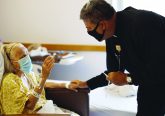Pro-life conference addresses ART
Monday, October 4, 2010
By Mary Caffrey Knapke
DAYTON DEANERY — If a particular procedure exists in modern science, does that necessarily mean humanity should use it? That was the question posed by Dr. Ashley Fernandes at the Pro-Life Science and Technology Conference held Sept. 11 at the Engineers Club.
 |
| Dr. Ashley Fernandes (Courtesy photo) |
Fernandes is a pediatrician and an assistant professor at Wright State University. He holds a medical degree from The Ohio State University and a Ph.D. in bioethics from Georgetown University. In his keynote address, “Assisted Reproductive Technology: Progress or Peril?” he described several methods of Assisted Reproductive Technology (ART) and addressed the ethical, moral and social concerns surrounding each.
According to the Centers for Disease Control (CDC), 7 percent of married couples experience infertility. In 2002 the CDC determined that 7.3 million women had sought some type of infertility services such as diagnosis, advice or treatment at some point in their lives. While infertility treatments range from medication to surgery — producing a dizzying array of acronyms such as ICI, IUI, IVF, ICSI, GIFT and ZIFT — the term “Assisted Reproductive Technology” typically involves the combination of eggs and sperm in a laboratory.
Fernandes noted a recent upsurge in the use of ART, citing data showing that the number of cycles performed in the U.S. nearly doubled between 1998 and 2007. In 2007 35 percent of ART cycles led to a pregnancy, while only 29 percent resulted in a live birth. Since the first successful birth of a “test tube baby” in 1978, 3 million children have been born using one form of ART, in vitro fertilization (IVF).
Fernandes outlined the Catholic Church’s opposition to ART, saying he is often asked, “Isn’t ART pro-life and pro-family?” In response, he points to the church’s position that life begins at conception and that all human life should be treated with dignity. As such, “embryos should not be treated as objects for experimentation, research or even to fulfill the wishes of prospective parents, however well-meaning.”
In addition, IVF disassociates procreation from the personal context and replaces it with a technical procedure. There are a host of ethical considerations stemming from the use of ART, including the freezing or destruction of embryos. And because multiple gestations are common with ART, there is an increased risk of pregnancy complications. Finally, multiple births — which have quadrupled over the past 25 years as a result of ART — affect the family and society in a variety of ways.
The presentation also addressed the question of embryo adoption, in which prospective parents “adopt” another couple’s frozen, unused embryos for use in an IVF cycle. The embryos might otherwise be destroyed, kept frozen indefinitely, or donated for use in embryonic stem cell research. Estimates place the number of frozen embryos around 500,000 nationwide. One source indicates that more than 200 children have been born through embryo adoption.
Fernandes indicated that some view embryo adoption as a heroic act of saving a human life that might otherwise be destroyed. On the other hand, the procedure begs complex moral questions based on the fact that it necessarily relies on technology that dehumanizes the person.
“From a Catholic point of view, the process by which that embryo is removed from cryopreservation and implanted by a third party still removes the personal element from the conjugal act,” he said. Some of the questions raised include whether good intentions mitigate one’s participation in reproductive technology, or whether “the process [of IVF] is so demeaning to the nature of the person that you should not be involved [in embryo adoption],” he said.
The annual Pro-life Science and Technology Conference provides an opportunity for the pro-life community to share scientific and technical information regarding a variety of issues. Other topics at this year’s conference included emergency contraception, the social and economic legacy of population control and defending life through audio. For more information, visit www.prolifescience.org.










